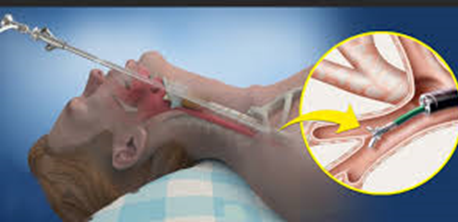A nurse is reinforcing teaching with a client who is scheduled to undergo a bronchoscopy. Which of the following client statements indicates an understanding of the teaching?
"I can have clear liquids up to 3 hours before the procedure."
"I can eat as soon as the procedure is completed."
"I will receive an injection of radioactive material prior to having the procedure.”
"I might have blood-tinged sputum after the procedure."
The Correct Answer is D
Choice A Reason:
"I can have clear liquids up to 3 hours before the procedure." This is incorrect. Clients are usually instructed to be NPO (nothing by mouth) for a certain period before the procedure, typically 6-8 hours, to reduce the risk of aspiration.
Choice B Reason:
"I can eat as soon as the procedure is completed." This is incorrect. Clients should not eat or drink until the gag reflex returns, which can take a few hours after the procedure.
Choice C Reason:
"I will receive an injection of radioactive material prior to having the procedure.” This is incorrect. An injection of radioactive material is not part of a bronchoscopy. This might be confused with a different diagnostic procedure, such as a PET scan.
Choice D Reason:
"I might have blood-tinged sputum after the procedure." This statement indicates an understanding of the teaching. It is common for clients to have a small amount of blood-tinged sputum following a bronchoscopy due to the irritation caused by the procedure.

Nursing Test Bank
Naxlex Comprehensive Predictor Exams
Related Questions
Correct Answer is ["A"]
Explanation
a. Have the client wear a surgical mask during transport. This is the appropriate intervention to prevent the spread of the influenza virus when the client needs to be transported within the healthcare facility. Influenza is primarily spread through respiratory droplets, so wearing a surgical mask helps to contain these droplets.
b. Wear an N95 mask while providing care to the client. An N95 mask is generally not required for influenza. Standard precautions, including wearing a surgical mask when within close proximity to the client, are usually sufficient.
c. Administer an influenza immunization to the client. It is not appropriate to administer the influenza vaccine to a client who is already infected with the influenza virus.
d. Place the client in a negative airflow room. Negative airflow rooms are typically reserved for airborne diseases such as tuberculosis. Influenza, which spreads via droplets, does not require this level of isolation.
Correct Answer is B
Explanation
Choice A Reason:
Isopropyl alcohol is the appropriate cleaning agent. While alcohol can be used as a disinfectant for some purposes, it might not be as effective as bleach against bloodborne pathogens like HIV. Bleach is generally recommended for disinfection in this context.
Choice B Reason:
Bleach is recommendable. Bleach is effective in disinfecting surfaces contaminated with bloodborne pathogens, including HIV. It's recommended for cleaning and disinfecting areas contaminated with blood as it can effectively kill many pathogens, including viruses like HIV. The standard recommendation is to create a solution of bleach and water to clean surfaces contaminated with blood.
Choice C Reason:
Hydrogen peroxide is not recommendable. Hydrogen peroxide has some disinfectant properties, but bleach is more effective against bloodborne pathogens like HIV when used to clean contaminated surfaces.
Choice D Reason:
Chlorhexidine is not appropriate. Chlorhexidine is an antiseptic commonly used for skin disinfection before procedures. While it's effective for certain purposes, it's not typically recommended for disinfecting surfaces contaminated with bloodborne pathogens like HIV. Bleach is the preferred agent in such cases.
Whether you are a student looking to ace your exams or a practicing nurse seeking to enhance your expertise , our nursing education contents will empower you with the confidence and competence to make a difference in the lives of patients and become a respected leader in the healthcare field.
Visit Naxlex, invest in your future and unlock endless possibilities with our unparalleled nursing education contents today
Report Wrong Answer on the Current Question
Do you disagree with the answer? If yes, what is your expected answer? Explain.
Kindly be descriptive with the issue you are facing.
